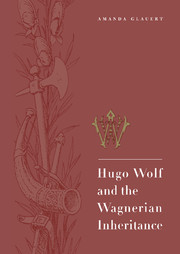Book contents
- Frontmatter
- Contents
- Acknowledgements
- Introduction
- 1 ‘Music of the future’? The nature of the Wagnerian inheritance
- 2 ‘Wagner of the Lied’? Wolf as critic of Wagner and Wagnerism
- 3 Small things can also enchant us – Wolf's challenge to nineteenth-century views of song
- 4 ‘Poetry the man, music the woman’? Wolf's reworking in his Mörike songs of Wagner's aesthetics of words and music
- 5 The integrity of musical language – questions of form and meaning in Wolf's Goethe songs
- 6 The Wolfian perspective – comparisons with the songs of Strauss and Mahler
- Notes
- Bibliography
- Index
3 - Small things can also enchant us – Wolf's challenge to nineteenth-century views of song
Published online by Cambridge University Press: 31 October 2009
- Frontmatter
- Contents
- Acknowledgements
- Introduction
- 1 ‘Music of the future’? The nature of the Wagnerian inheritance
- 2 ‘Wagner of the Lied’? Wolf as critic of Wagner and Wagnerism
- 3 Small things can also enchant us – Wolf's challenge to nineteenth-century views of song
- 4 ‘Poetry the man, music the woman’? Wolf's reworking in his Mörike songs of Wagner's aesthetics of words and music
- 5 The integrity of musical language – questions of form and meaning in Wolf's Goethe songs
- 6 The Wolfian perspective – comparisons with the songs of Strauss and Mahler
- Notes
- Bibliography
- Index
Summary
On the evidence of Wolf's life there are many signs that he struggled with the image of himself as a specialist song-writer, sensing the limitations this placed on him in the eyes of the public. He once said that he even regretted the popularity his songs received because it implied he was incapable of composing anything larger. He wished to assert himself more unmistakably in the genre of opera, but he also believed that his songs were of the greatest artistic significance if only people would recognise it. The composer would inveigh against concert organisers bypassing his ‘small things’ in favour of ‘greater riches’, believing that like Josef Schalk – who created a furor by performing Wolf's songs with Beethoven orchestral music in one of the Viennese Wagner Society's concerts – they should be prepared to go against the tide of common opinion. Indeed several critics joined Wolf in warning audiences, composers and performers of the dangers of valuing musical size and stylistic effect over subtler matters of spiritual content. Max Graf, for one, believed that it was ‘psychological effects, unseen affinities, which more than any other aesthetic values, should identify an artist as modern’. The philosopher Friedrich Hausegger also encouraged composers to follow an aesthetic of ‘inwardness’, as summed up in his idea of ‘Musik als Ausdruck’ (Music as expression).
- Type
- Chapter
- Information
- Hugo Wolf and the Wagnerian Inheritance , pp. 32 - 47Publisher: Cambridge University PressPrint publication year: 1999



